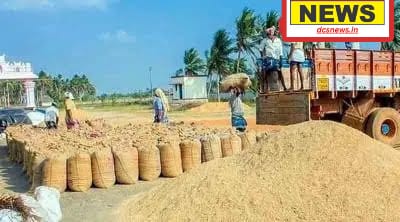Tamil Nadu Farmers Express Discontent Over Changes in Paddy Procurement System

Chennai, Feb 3, 2025 – Farmers in Tamil Nadu have voiced strong opposition to the recent changes in the state’s paddy procurement system, which they argue are detrimental to their livelihoods and financial well-being. The new rules, introduced by the Tamil Nadu government, have sparked widespread protests among agricultural communities, who claim that the shift will only worsen the already difficult situation they face in the state’s agricultural sector.
Details of the Changes
The Tamil Nadu government has introduced a revised paddy procurement mechanism, aimed at improving efficiency and reducing the burden on the public exchequer. However, the changes have not been well received by the farmers, who believe it will adversely affect them.
🔹 Key Changes in the Procurement System:
✔️ Centralized procurement process – Farmers are now required to transport their paddy to designated procurement centers, resulting in higher transportation costs.
✔️ Delayed payments – The new system has reportedly caused significant delays in payments, leaving farmers waiting longer for their dues.
✔️ Reduced procurement prices – Some farmers have raised concerns over lower than expected prices being offered for their crops, which is making it difficult for them to cover production costs.
Farmers’ Concerns
Farmers in rural Tamil Nadu have expressed deep dissatisfaction with the new procurement system, claiming it will lead to severe economic strain. They argue that the delayed payments, coupled with the increased transportation costs, will make farming unsustainable for many small-scale farmers.
🚜 A farmer from Thanjavur district stated:
“We already struggle with unpredictable weather and rising input costs. These changes make it even harder for us to make ends meet. We used to get paid immediately after our produce was collected, but now we have to wait months for our payment.”
Protests and Reactions
The changes have led to farmer protests across several regions of Tamil Nadu, especially in rice-producing areas such as Thanjavur, Tiruvarur, and Cuddalore. Farmers have been holding demonstrations, blocking roads, and demanding a rollback of the new system.
💬 Farmers’ Union Leaders have called for a statewide strike to voice their opposition, urging the government to address their concerns before the upcoming harvest season.
Government’s Stand
While the state government has acknowledged the protests, it has defended the revised procurement system, stating that the changes are necessary to improve efficiency and ensure fair pricing for paddy farmers across the state.
🗣️ Tamil Nadu Agriculture Minister’s Statement:
“The government is committed to supporting farmers, but we need to balance the procurement process with fiscal responsibility. We are looking into the concerns raised by farmers and will make adjustments if necessary.”
Impact on Farmers and Future Projections
The revised procurement system, if not modified, could lead to increased financial pressure on farmers, many of whom are already struggling with low profit margins and high input costs. The unpredictable nature of the monsoon, coupled with rising input costs such as fertilizers and labor, has made it increasingly difficult for farmers to make a profit.
🔴 Expert Opinion:
According to agricultural economists, small-scale farmers will be the most affected by these changes, especially those in remote areas who have limited access to transportation and markets. The government needs to ensure that these farmers are not left behind, and proper mechanisms are put in place to reduce the financial burden.
Conclusion
While the Tamil Nadu government’s intention behind the changes in the paddy procurement system may have been to improve operational efficiency, the unforeseen consequences are hurting the very farmers they were intended to help. The ongoing protests and demands for revision underscore the importance of maintaining a balance between government reforms and the well-being of farming communities.





